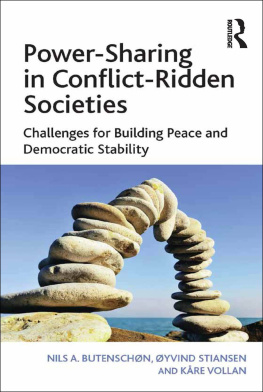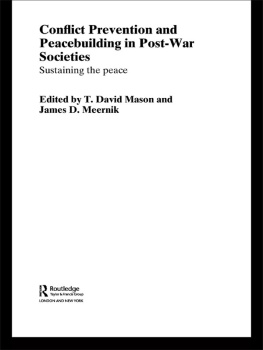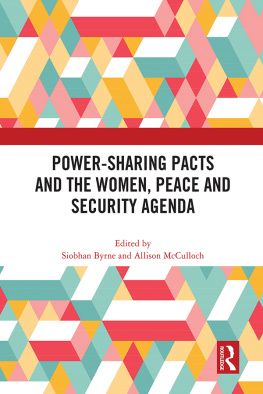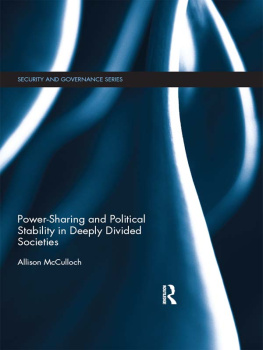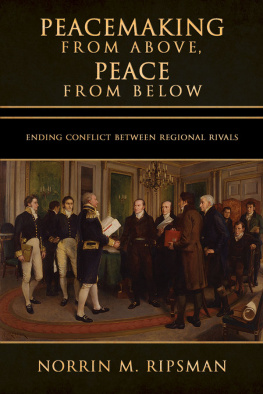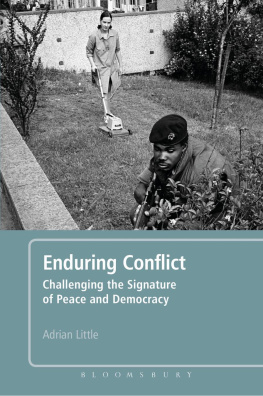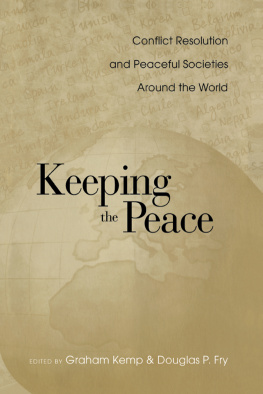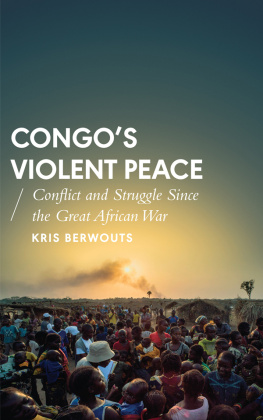POWER-SHARING IN CONFLICT-RIDDEN SOCIETIES
Power-Sharing in Conflict-Ridden Societies
Challenges for Building Peace and Democratic Stability
NILS A. BUTENSCHN
University of Oslo, Norway
YVIND STIANSEN
University of Oslo, Norway
&
KRE VOLLAN
Quality AS, Norway
First published 2015 by Ashgate Publishing
Published 2016 by Routledge
2 Park Square, Milton Park, Abingdon, Oxon OX14 4RN
711 Third Avenue, New York, NY 10017, USA
Routledge is an imprint of the Taylor & Francis Group, an informa business
Copyright Nils A. Butenschn, yvind Stiansen and Kre Vollan 2015
Nils A. Butenschn, yvind Stiansen and Kre Vollan have asserted their right under the Copyright, Designs and Patents Act, 1988, to be identified as the authors of this work.
All rights reserved. No part of this book may be reprinted or reproduced or utilised in any form or by any electronic, mechanical, or other means, now known or hereafter invented, including photocopying and recording, or in any information storage or retrieval system, without permission in writing from the publishers.
Notice:
Product or corporate names may be trademarks or registered trademarks, and are used only for identification and explanation without intent to infringe.
British Library Cataloguing in Publication Data
A catalogue record for this book is available from the British Library
The Library of Congress has cataloged the printed edition as follows:
Butenschn, Nils A. (Nils August), 1949-
Power-sharing in conflict-ridden societies : challenges for building peace and democratic stability / by Nils A. Butenschn, yvind Stiansen and Kre Vollan.
pages cm
Includes bibliographical references and index.
ISBN 978-1-4724-6786-7 (hardback) -- ISBN 978-1-3156-0186-1 (ebook) -- ISBN 978-1-3170-7674-2 (epub) 1. Comparative government--Case studies. 2. Coalition governments--Case studies. 3. Peace-building--Case studies. 4. Democratization--Case studies. 5. Political stability--Case studies. 6. Conflict management--Case studies. I. Stiansen, yvind. II. Vollan, Kre. III. Title.
JF51.B87 2015
324--dc23
2015010329
ISBN: 978-1-4724-6786-7 (hbk)
978-1-3156-0186-1 (ebk)
978-1-3170-7674-2 (ePub)
Contents
List of Figures
List of Tables
Preface
Power-Sharing in Conflict-Ridden Societies: Challenges for Building Peace and Democratic Stability is a project that builds on and complements a previous project, Electoral Quotas and the Challenges of Democratic Transition in Conflict-Ridden Societies (first published in 2011). Both projects are organised under NORDEM, the Norwegian Resource Bank for Democracy and Human Rights at the Norwegian Centre for Human Rights, University of Oslo. The overall purpose is to contribute with systematic analysis of alternative institutional designs of political institutions in conflict-ridden societies in critical stages of political transition from open conflict to democratic stability.
The first report looked particularly into electoral quotas as one mechanism available to overcome the dilemma: What are the effects of introducing quotas? Will they contribute to democratic stability or rather preserve and strengthen the cleavages that led to open conflict in the first place? The report included the three cases of Lebanon, Bosnia and Herzegovina and Nepal, and in addition a broad overview of all relevant systems in the world where such quotas are applied. The present report broadens the perspective to include a larger range of power-sharing elements: Devolution of powers, representation, form of governments and grand coalitions, and decision-making rules. The number of cases has also been extended to include Burundi, Rwanda, Ethiopia, Myanmar, the Philippines and Fiji, in addition to re-worked cases from the first report. To the best of our abilities the presentations of the cases are updated as of November 2014.
This project could not have been realised without the institutional support by the Norwegian Centre for Human Rights. Siri Skre, Director of International Programmes at the Centre, has had the administrative responsibility.
We would like to thank the Norwegian Ministry of Foreign Affairs for their generous support making this study possible. We are also grateful for the invaluable support we received from Norwegian embassy personnel in conducting our fieldwork for the case studies.
Nils A. Butenschn
yvind Stiansen
Kre Vollan
Oslo, Norway
Chapter 1
Introduction
Most conflicts since the Second World War have been intra-state, and the predominance of internal conflict has increased since the end of the Cold War. The scale of intra-state conflicts varies greatly from all-out civil wars and genocide to low-intensity conflicts with few casualties. The effects on human security and development are disastrous.
It is a well-established principle among states that intra-state conflicts are a legitimate concern for the international community to the extent that such conflicts involve massive violations of human rights or a threat to international peace and stability. In this way, intra-state conflicts become foreign policy concerns of some or all states, even if these states are not themselves party to the conflict.
Increasingly also, civil wars are terminated by negotiated solutions rather than by victory for one side, which was the dominant settlement pattern during the Cold War.
The purpose of the present study is firstly, to analyse the nature of the formal and informal post-conflict arrangements that define the political order and the rules of the game in a select number of conflict-ridden countries, and secondly, to evaluate the effects of these arrangements as implemented with the view to whether they seem to strengthen or weaken the stated goals of sustainable peace and lasting democracy. In this study we focus particularly on the significance of the effects of alternative institutional designs for the future sustainability of democratic politics, not on the processes related to the peace negotiations themselves and transitional justice, however important that might be for the immediate political climate.
We look particularly into cases of conflicts between socio-cultural groups mobilised along ethnic, religious and other socio-cultural cleavages. The two reports address a classical theme in political analysis: How can designing a political system contribute to overcoming deep-seated conflicts in society? Peace agreements after civil wars should seek to overcome the mistrust and enmity between the groups, possibly overcoming the conflict-producing cleavage structure itself. The assumption is that democracy and stability are strengthened if citizens see their interests in terms of socio-economic factors across cultural divides rather than in terms of socio-cultural identities. The recommendation would therefore be to encourage types of political representation that criss-cross cultural divides in society. On the other hand, a democratic system should also reflect real opinions and interests in society as the voters themselves define them. We observe that in most post-conflict societies, the political system tends to be organised along the ethnic divides that defined the previous conflict. The dilemma then is how a democratic principle of representation that tends to reflect group-based identities can contribute to overcoming group-based conflict dynamics.

